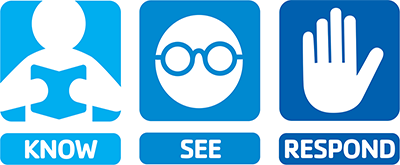Tips for Protecting Youth From Sexual Abuse

1. KNOW
KNOW how to recognize boundary violations and how offenders operate. It’s up to us as adults to do all we can to prevent child sexual abuse and create safe environments for children. Teaching children about their bodies, recognizing warning signs, and responding to any concerns are important first steps. Even very young children can learn some skills to help keep themselves safe from sexual abuse, but it’s up to parents to help them learn what they need to know. Here are some important things you can teach that will help you help your child stay safe.
Teach Your Child Rules About Touching Their Body
Preschoolers understand the idea of rules, such as rules about playing nicely with others and rules about being safe, like wearing seat belts. So as you teach these rules, just add rules about touching their bodies.
First, talk to your child about body parts, including private parts.This will give your child words to use when he/she needs to tell you anything about his/her body, like an injury or rash or other problem in that area.
Then add rules about private parts, like “Never let other people touch your private parts unless Mommy or Daddy knows about it.” Children also need to know what to do when someone breaks the rules about touching. Teach them:
- What to say to someone who breaks the rules about touching
- To move away from someone who is breaking the rules about touching
- To tell you or another adult if someone breaks the rules about touching
- Phrases so he/she can tell others to stop and practice saying them with your child
- Teach your child to say this anyone who invades their privacy (other children as well as to adults)
- To move away from anyone who is breaking the rules about touching
- Tell your child that it’s ok to get out of someone’s lap or pull away from a hug, even if an adult asks them not to
- To tell you or another adult, like a teacher or caregiver, if someone breaks the rules about touching them
2. SEE
SEE. Keep your eyes and ears open for signs of abuse and talk with your child, asking them about your concerns. If something is wrong, you may see a sudden change in your child’s behavior, or you may hear unusual comments. If you see or hear these things, follow up. Find a relaxed time to talk with them.
Child Abuse Warning Signs
- Frequent or unexplained bruises or injury
- Unkempt or malnourished appearance
- Bathing frequently; obsessive cleanliness
- Disturbed sleeping or eating patterns
- Inability to stay awake or concentrate for extended periods
- Abrupt changes in behavior, anxiety, clinging, aggressiveness or withdrawal
- Sudden, dramatic changes in activities or personality
- Sexually transmitted diseases and infections
- Fear of a certain person (this can include other minors) or place
- Discomfort with physical contact
- Fearfulness or depression
- Aggression toward adults or other children
- Abuse of other children
- Nervousness around adults
- Low self esteem
- Displays knowledge or interest in sexual acts inappropriate to his/her age
Watch for these things in adults that may signify potential abuse. Remember, offenders seek access, privacy & control.
Emotional Boundary Violations
- Making them feel important, cared about and understood
- Spending too much time with them
- Choosing favorites
- Giving gifts
- Acting possessive
- Sending excessive or inappropriate text messages
- Pretending to be the child’s friend on social networking sites like Facebook
- Sharing personal information to make the child feel like they have a special relationship
- Promising extra coaching time, a college scholarship, a place on a national team or even an Olympic Team spot!
Physical Boundary Violations
- Tickling
- Horseplay
- Hugging
- Massaging
- Wrestling
- Going overboard with affection
Behavioral Boundary Violations
- Offenders manipulate kids into doing things they wouldn’t otherwise do, such as:
- Sneaking around by saying they will be in one place when actually they are in another
- Keep secrets with the offender
- Look at pornography
- Use drugs or alcohol
3. RESPOND
RESPOND. If you see warning signs from your child or adult, or you hear about something that sounds like abuse, report it immediately.
If your child tells you about sexual abuse or inappropriate behavior, here’s how to react. Your response plays a big role in how your child understands abuse and how he/she recovers.
- Stay calm.
- Comfort your child.
- Listen carefully.
- Ask for examples.
- Do not threaten or criticize the person your child is accusing.
If what you learn from your child or if what you’ve observed or overheard at practice sounds like abuse, call Child Protective Services or the police. If what you learn from your child, or if what you’ve observed or overheard at practice, sounds like a boundary violation, suspicious or inappropriate behavior, or a policy violation, then:
- Share your concerns with the employee, supervisor, or the person in charge of your organization. Be sure to follow up with both your child and the adult you’ve talked to.
- If you are unable to do this, you can share your concerns with the Board President and you can make a report to the organization by making a call, sending an email, or submitting the online form.



